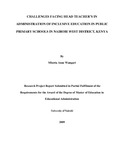| dc.contributor.author | Wangari, Mberia A | |
| dc.date.accessioned | 2014-09-02T11:14:24Z | |
| dc.date.available | 2014-09-02T11:14:24Z | |
| dc.date.issued | 2014-09-02 | |
| dc.identifier.uri | http://hdl.handle.net/11295/73999 | |
| dc.description | Degree of master in Education in Education admnistration. | en_US |
| dc.description.abstract | The findings of various commissions in the education sector posit that the
responsibility of ensuring inclusive education in learning institutions rests with
the teachers and head teachers who are curriculum implementers. The purpose
of the study was to investigate challenges faced by head teachers in
implementation of inclusive education in regular schools in Nairobi West
District.
The study sought to find out the head teachers view on reasons for the problem
encountered and recommendation in dealing with the problems. It was also the
intention of the study to find out from regular teachers the problems
encountered and their views of the head teacher. This was done by asking
respondents about their educational qualifications, attitudes, feelings and the
attitudes of parents.
A descriptive survey design was used. Random sampling was used to sample
thirty five schools that were used in the survey. At the end of data collection
period, thirty five schools took part in the survey indicating a response rate of
85.7%. The teachers were randomly selected from the schools and the head
teachers selected from the schools as respondents. Data was collection using
questionnaires and interview schedules. The questionnaires were designed for
teachers while the interview schedules were designed for the head teachers.
The instruments were tested for internal validity and reliability and found to be
reliable and valid. The collected data was coded and analysed using SPSS
software. The results are presented in tables and charts. .
The instruments of the study were: a questionnaire for teachers chosen
because the target respondents could give valid information about head
teachers leadership styles and their involvement in inclusive education and an
interview schedule for head teachers to find out their attitudes feelings,
knowledge and skills about implementing inclusive education. The
instruments validity was ascertained by conducting a pilot study and
consultation with experts especially my supervisors
The researcher used test – re –test in assessing reliability. Data were collected
by the researcher personally administering research instruments in the schools.
Data was analysed as guided by a computer programmer and descriptive
statistics was used. The analysed data formed the basis for research findings,
conclusions and recommendations for the study. Data was analysed using
frequencies percentages and summaries.
Findings of the study included the following: most teachers are willing to have
learners with special needs in their classrooms; parents needed sensitisation in
order to change their attitudes; principals need training on proper methods of
administration in order to be in the forefront in sensitising the parents,
community and teachers. Teachers also felt that head teachers are not well equipped with managerial skills and qualifications which is paramount in
management and in order to support their staff in new innovations; teachers
were ready to teach learners with special needs; there was lack of adequate
materials; the environment was not appropriate for inclusive education.
The study found that the challenges facing head teachers in the
implementation of inclusive education include lack of proper training of
teachers and head teachers, lack of resources
specific for children with special needs, teachers and parents’ attitudes, and
contents of the syllabus not being specific to children with special needs. The
study concludes that indeed the head teachers face various challenges as
concerns inclusive education. The study therefore recommends that teachers
need to be trained more on handling of children with special needs while head
teachers need training in both special needs education and administration in
order to acquire necessary skills for leadership and management. The
researcher recommends that head teachers should acquire appropriate
leadership skills and methods of the same to enable them incorporate ideas and
innovation from regular teachers. Since it is evident that lack of skills leads to
their making decisions alone with little or no consultations at all.
This study should be replicated in other arrears in order to establish the
challenges faced by head teachers in school management. The schools which
have management problems could possibly benchmark from those which have
implemented inclusive education. The quality of schools depends largely on their leadership. It is also said that
“schools are as great as their managers”. If they are charged with the
monumental task of managing schools, then it is paramount that they acquire
management qualifications and skills. | en_US |
| dc.description.sponsorship | University of Nairobi | en_US |
| dc.language.iso | en | en_US |
| dc.subject | Challenges facing headteachers | en_US |
| dc.subject | Education in public primary school | en_US |
| dc.subject | Nairobi west district,Kenya | en_US |
| dc.title | Challenges facing headteachers in administration of inclusive education in public primary schools in Nairobi west district,Kenya. | en_US |
| dc.type | Thesis | en_US |
| dc.type.material | en | en_US |

